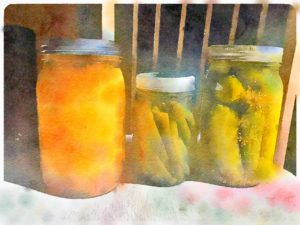
Waterlogue by Tinrocket 1.0.8 Windows
Preset Style = Bold
Output Size = Giant
Lightness = Normal
I have been a performing musician for almost 50 years. I have enjoyed the variety of events I’ve played for; from river trips through the Grand Canyon to bat mitzvas, to groups of partying investment bankers, to wide-eyed kindergarteners. When I answered the ringing phone I didn’t recognize the name of the caller. “I’ve heard you do programs at the senior center where my mother was a resident. Mom died yesterday—she always enjoyed your performances. I wonder if you would conduct a little celebration service for her and do some specific songs?” I remembered her mother as the little lady who always sat front-and-center and was totally engaged by the music. I checked my calendar and told her I was available.
I arrived at the center early and set up my amplifier. I played several instrumentals as the guests found their seats and filled the room. I led the group in singing her favorite hymns. The varied voices blended in a warm chord. People began sharing stories about their vibrant, loving friend and the picture of a life well lived was painted. We sang “Country Roads” with an awareness of roads we would no longer travel. We sang “Amazing Grace” and as the words faded away, I reflected on the power of song to unify and build connections.
“I was born in 1914. I like gospel music.” The woman before me didn’t look to be 102 years old. She perched spryly on her chair and questioned me about my custom guitar, the wood used in its construction and its maker. Her husband and companion in life sat silently beside her. The hospice had invited me to sing for an elderly couple. I launched into “Wings of a Dove” and she reached for her husband’s hand and bowed her head. Outside the window the yellow aspen leaves danced and drifted down through warm sunbeams. Small brown birds hopped across the ground. As I finished she looked up and praised the sound of my guitar. “The man who made that knew what he was doing,” she said.
I played several more gospel songs and then on a hunch I sang Greg Brown’s evocative tune about food and family, “Canned Goods.” “Peaches on the shelf/Potatoes in the bin/Supper’s ready, everybody come on in/Taste a little of the summer … My grandma’s put it all in jars.”
As I played I heard the husband keeping time by clicking his ring against his cane. The song tells the story of a loving grandmother who works hard all summer gardening and storing the harvest for the dark days of winter to feed her family.
“Ah, she’s got magic in her hands, you know what I mean/She puts the sun and the rain in with her beans … She cans the pickles sweet and dill/She cans the songs of the whippoorwill … You bet, Grandma, as sure as you’re born/I’ll take some more potatoes and a thunderstorm.”
I let the last notes ring out and decay. The woman raised her head. Her eyes were wide with excitement and enthusiasm and she said, emphatically, “You got that right!” She sat up straight and said, “There were 12 of us kids and mom had shelves and shelves under the stairs for all her canned goods. We canned everything. There was corn and beans and pears and all kinds of fruit. Peaches! Alberta peaches. All of us kids had to peel peaches. Daddy would get a big metal washtub and fill it with water, then he would dump a basket full of peaches in the water. We kids would gather around the tub. We each had a bowl and a knife and we peeled peaches. Peaches! I hated peeling peaches. I’ve peeled 100 bushels of peaches.”
I asked, “Was it worth it in the dead of winter to have those peaches?”
“Oh yes,” she replied. “My mother made the best peach cobbler. It was good. We couldn’t go to the store and buy ice cream, but we would take clean snow and sprinkle sugar on it and that was our ice cream. Daddy had a cellar where he stored vegetables for the winter and other things—Irish potatoes and sweet potatoes. He would get a whole truck load of apples and put them between layers of straw in the storage cellar and we kids could get an apple anytime we wanted.”
She sat back and looked out the window at the garden where hollyhocks still bore colorful blossoms under a sky of the purest blue.
“Back in the country where I grew up they made their instruments—carved the wood into guitars and banjos. You could tell they were homemade but they could really play them. On Saturday, they would come from miles around by wagon, they didn’t have cars. There would be a half-dozen of them on the platform and someone banging on the piano and they would sing, sing, sing. You could hear ‘em a mile away, singing.”
She reminisced about the Depression years and how the community would stock a free store with any extra vegetables and canned goods they could spare. “You could take what you needed and it didn’t cost a cent.”
Her enthusiasm was contagious. We chatted about her distant childhood experiences and how the world had changed as the sunlight moved across the floor and life buzzed outside the room.
“We thought life was rough but looking back it was a wonderful time. You had to provide your own food—there was no relief. Our dad always knew where we were. He’d say, ‘Come straight home from school.’ We would change clothes and do our chores. That life is gone now.”
As I packed up my guitar she thanked me and invited me to “come back anytime.” Her husband’s chin rested on his chest as he softly slept. Country roads take me home.

